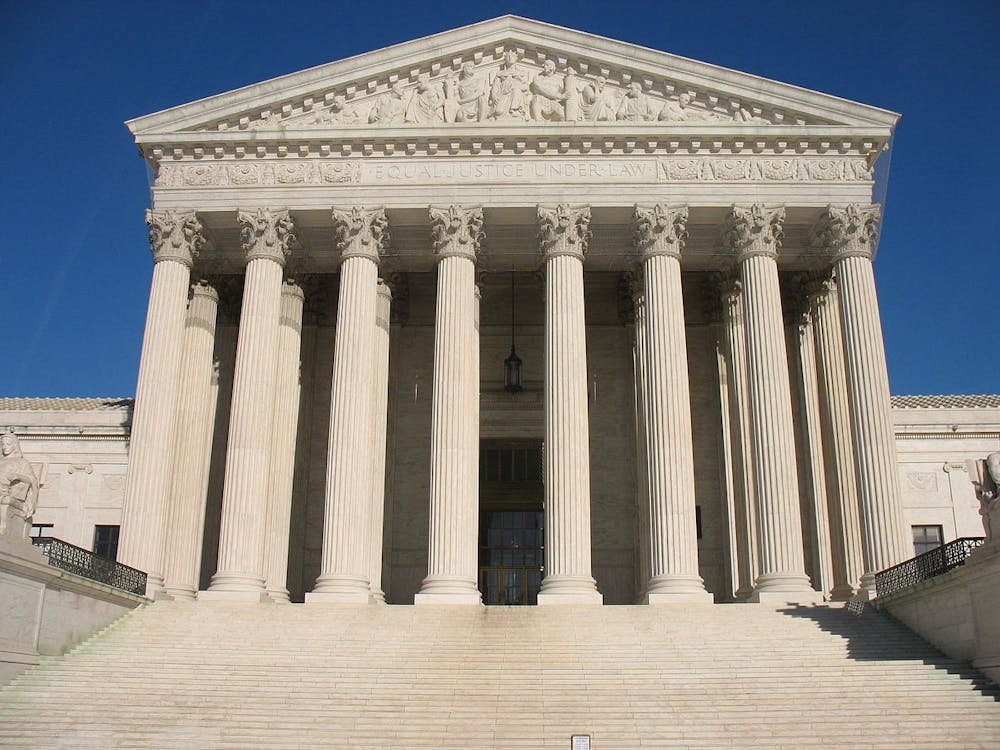In 1973, the Supreme Court ruled on Roe v. Wade. In 2015, it ruled on Obergefell v. Hodges. These two landmark cases ruled that women had the right to have an abortion, and same-sex couples had the right to marriage. With the appointment of Amy Coney Barrett to the Supreme Court, many marginalized students at Miami University are now fearful that these decisions could be overturned.
Barrett's confirmation, which was finalized eight days before the presidential election, created a 6-3 majority of conservative justices on the court.
Madi McGirr, a member of Spectrum, one of Miami’s LGBTQ+ organizations, said she does not approve of Barrett's rushed confirmation, but she isn't surprised, either.
"I don't necessarily believe in respectability politics anymore because the Republicans have never shed that kindness onto us," McGirr said. "I was fully expecting this when RBG died because I know that this is just how the Republicans play. The Democrats really care about being respectable, but the Republicans don't, politically."
Evan Gates, community outreach director for Feminists Working On Revolutionary Democracy (FWORD), felt similarly.
"As a representative of FWORD, we are not happy with the nomination,” Gates said. “We feel that the judiciary process was rushed in the context of the legal precedents that were already set in 2016 through President Barack Obama's previous appointment and how Senator McConnell treated that."
In 2016, when Obama named Merrick Garland to fill Justice Antonin Scalia's place on the Supreme Court, Senate Majority Leader Mitch McConnell refused to move forward with the nomination, stating "the American people should have a say in the court's direction," NPR reported in 2018.
A self-proclaimed "constitutional originalist," Barrett says she plans to interpret the Constitution the way it was written. McGirr fears originalist rulings could endanger LGBTQ+ people. Although the prospect of marriage inequality is scary, she said, her main fear is for transgender people losing their healthcare.
“Without the healthcare that they can get and without the support that they can get, this puts people's lives directly at risk," McGirr said. "It was only a few years ago that we were granted the ability to marry the people that we love, and it's scary to think that it could be taken from us once again."
In August, the Trump administration was blocked by a federal judge from passing a regulation that would roll back healthcare protections for transgender people, according to NBC and the Associated Press.
McGirr fears decisions like this could be passed by the Supreme Court in the future.
"When a transgender person has a life-threatening disease, what are they supposed to do? Apparently just die, according to Trump," McGirr said. "Trump has enacted a ton of policies that have been anti-gay, and he has appointed Gorsuch and Kavanaugh, who are both openly anti-gay. They do not support the LGBTQ+ community."
Enjoy what you're reading?
Signup for our newsletter
While Barrett has not directly commented on whether she will look to overturn Roe v. Wade, many fear that she will. Were that to happen, Gates said, FWORD worries the targeting of Planned Parenthood would result in women losing access to other services as well.
"Planned Parenthood also helps women who do intend to go through with their pregnancies and provides ultrasounds, [and] provides information on how it all will work," Gates said. "Those services are also low-cost or no-cost, so working class people will suffer, working class women will suffer from a lack of access."
Both Gates and McGirr expressed concerns that the overturning of Roe v. Wade will not stop abortions, only keep them from being safe and legal.
"The whole idea of the clotheshanger abortion, those are real," Gates said. "People will go to lengths, especially in the case of medical things, to get their hands on what they feel like they need to have."
With constant changes in presidents and Supreme Court justices, McGirr and other LGBTQ+ students feel unsafe and uncertain about the future.
"It's just a little bit ridiculous to have this back-and-forth of 'here's your autonomy, here's your protections,' and then a couple years later when more people are confirmed into the Supreme Court, they can threaten to take it away again,” McGirr said. “Then you just have queer people living in fear once again. It's scary."
The toll this fear takes on LGBTQ+ people, McGirr said, is massive.
"Just for once in my life, I would love for someone to email the Spectrum email to talk about queer joy," McGirr said. "Any time anyone wants to talk to us, it's about queer suffering … Anytime stuff like this happens, we all as a community feel this grief, this fear, this crippling anxiety around, 'Holy shit, the people that I love could be in danger –I could be in danger.' It proves that you aren't safe in the country that you live, and when we have to open up and continually after interview after interview you have to open up about why we deserve rights, why we deserve to live, it takes a toll on you. It takes a toll on the community."




